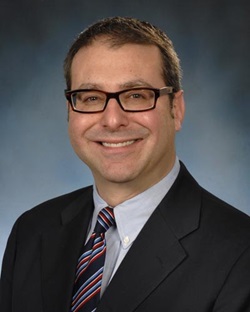University of Maryland School of Medicine Public Health Expert Promotes Family-Centered Approach in Intensive Care
Contact:
Bill Seiler:

Baltimore, MD – February 27, 2016: Critical care in a hospital intensive care unit (ICU) can save lives, but the experience can trigger anxiety, depression and traumatic stress for the patient, their family and loved ones. The stress often continues beyond discharge, as the disabled patient returns home but still needs care from the family. New guidelines, co-authored by a University of Maryland School of Medicine (UM SOM) researcher, promote family-centered care in neonatal, pediatric, and adult ICUs, which may improve patient outcomes. The guidelines appear in the journal Critical Care Medicine.
Family-centered care is defined as healthcare that is "respectful of and responsive to individual families' needs and values." Family-centered care recognizes the central importance of the family to the patient's recovery.
"These guidelines will help increase the focus on the entire family as it goes through the intensive care experience," says Giora Netzer, MD, associate professor of medicine, epidemiology & public health at UM SOM. "It's a new commitment among physicians and reflects the large number of family support interventions that may improve care," adds Dr. Netzer, who is also a pulmonologist and critical care specialist at the University of Maryland Medical Center (UMMC).
A 29-member international panel of critical care, nursing, and public health experts reviewed hundreds of studies then developed the evidence-based guidelines for family-centered ICU care. Patients and families validated the importance of various approaches and outcomes.
Some of the 23 recommendations, grouped into five areas, include:
- Family presence in the ICU. "Open or flexible" family presence in the ICU, along with support and positive reinforcement for staff in partnership with families.
- Family support. Family education and instruction on how to assist with care.
- Communication with family members. Family conferences to promote communication and trust between family members and clinicians and lower the risks of anxiety, depression, and posttraumatic stress symptoms.
- Specific consultations and ICU team members. Palliative and ethics consultations, as well as the roles of psychologists, social workers, family navigators, and spiritual advisors.
- Operational and environmental issues. Policies and procedures to support family-centered care, for example, considering space for family members to sleep.
Most ICUs at UMMC have essentially unlimited visiting hours, according to Dr. Netzer. The benefits of those visits may extend well beyond the hospital stay. For example, "Geriatric research shows improved outcomes when family members are with their older loved ones in the ICU, because they can touch, orient, talk to and engage the patient, and do all the little things that matter— bring eyeglasses, bring hearing aids, bring teeth," says Dr. Netzer. Other research indicates that stroke survivors who have active, supportive families, do better.
Despite the large amount of research, Dr. Netzer underscores there are many areas of family-centered care where the evidence is not as strong as it could be. "A lot of the recommendations come from observational, single-center, before-and-after-studies, rather than more rigorous, randomized scientific studies. These data are still in their early stages, so the recommendations are not as strong as we'd like them to be," says Dr. Netzer.
"The guideline panel rightly calls for future research to identify the most effective steps to improve ICU care," says E. Albert Reece, MD, PhD, MBA, vice president for medical affairs, University of Maryland; the John Z. and Akiko K. Bowers Distinguished Professor; and dean, University of Maryland School of Medicine. "Our hope is that family-centered ICU care will continue to expand as we learn more through well-designed studies."
The guidelines have been endorsed by nine leading critical care and family-centered care specialty organizations in North America and Europe.
###
About the University of Maryland School of Medicine
Commemorating its 210th Anniversary, the University of Maryland School of Medicine was chartered in 1807 and is the first public medical school in the United States. It continues today as an innovative leader in accelerating innovation and discovery in medicine. The School of Medicine is the founding school of the University of Maryland and is an integral part of the 11-campus University System of Maryland. Located on the University of Maryland’s Baltimore campus, the School of Medicine works closely with the University of Maryland Medical Center and Medical System to provide a research-intensive, academic and clinically based education. With 43 academic departments, centers and institutes and a faculty of more than 3,000 physicians and research scientists plus more than $400 million in extramural funding, the School is regarded as one of the leading biomedical research institutions in the U.S. with top-tier faculty and programs in cancer, brain science, surgery and transplantation, trauma and emergency medicine, vaccine development and human genomics, among other centers of excellence. The School is not only concerned with the health of the citizens of Maryland and the nation, but also has a global presence, with research and treatment facilities in more than 35 countries around the world. http://medschool.umaryland.edu.
About the University of Maryland Medical Center
The University of Maryland Medical Center (UMMC) is comprised of two hospitals in Baltimore: an 800-bed teaching hospital – the flagship institution of the 12-hospital University of Maryland Medical System (UMMS) – and a 200-bed community teaching hospital, UMMC Midtown Campus. UMMC is a national and regional referral center for trauma, cancer care, neurocare, cardiac care, diabetes and endocrinology, women's and children's health, and has one of the largest solid organ transplant programs in the country. All physicians on staff at the flagship hospital are faculty physicians of the University of Maryland School of Medicine. At UMMC Midtown Campus, faculty physicians work alongside community physicians to provide patients with the highest quality care. UMMC Midtown Campus was founded in 1881 and is located one mile away from the University Campus hospital.
